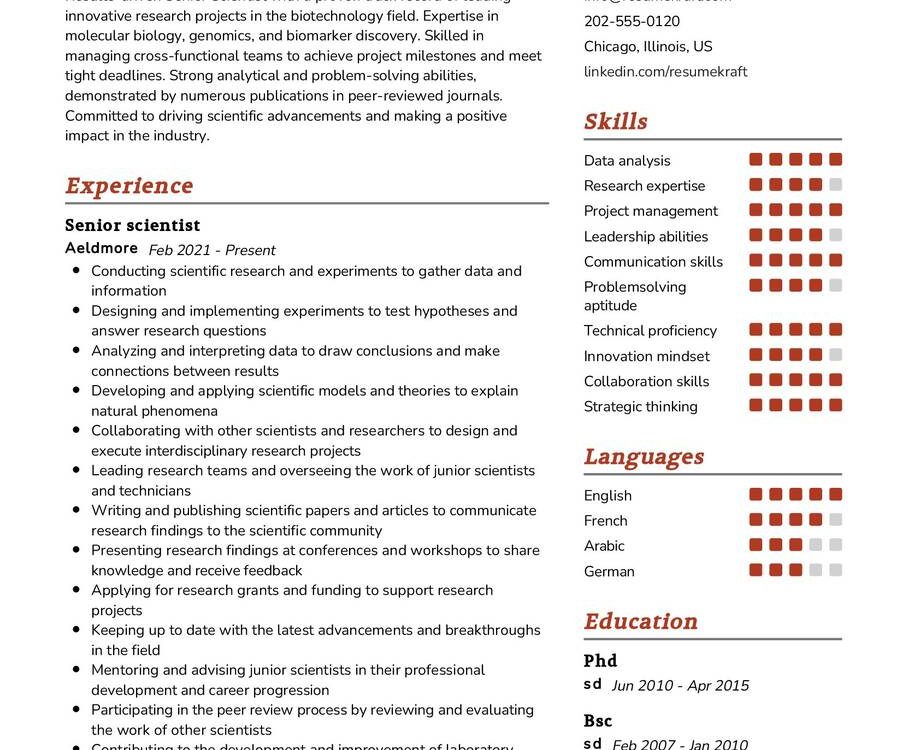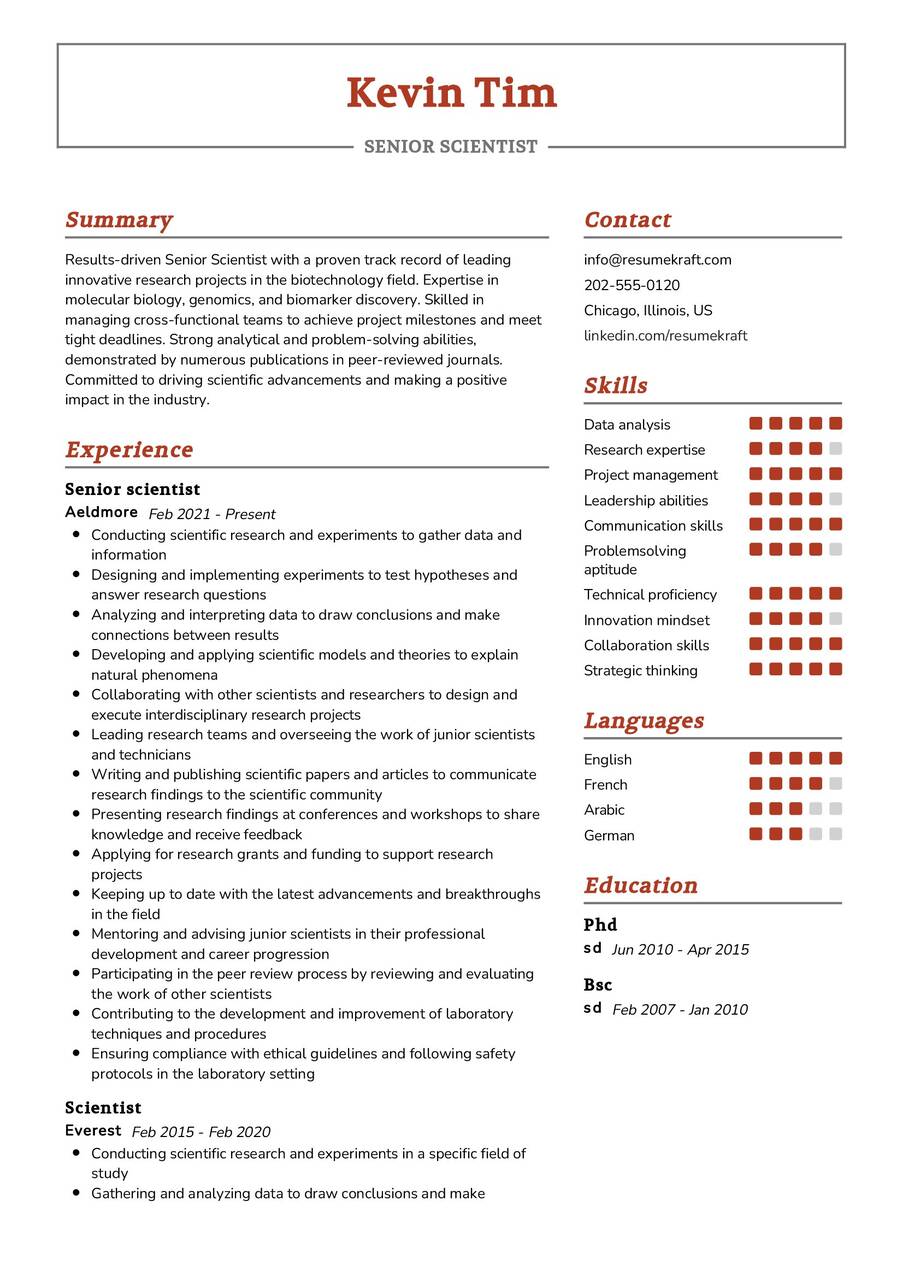Exploring the Role of a Senior Scientist
As the scientific landscape advances, the role of a Senior Scientist becomes increasingly crucial in shaping breakthroughs and innovations. This position requires a unique blend of scientific expertise, leadership skills, and a commitment to pushing the boundaries of knowledge. In this article, we’ll delve into the multifaceted role of a Senior Scientist, exploring the qualifications, responsibilities, and tips for crafting an impressive resume in this dynamic field.
Senior Scientist Job Requirements
Becoming a Senior Scientist demands a set of stringent qualifications and experiences. Let’s take a closer look at the prerequisites one must fulfill to thrive in this role:
- A Ph.D. in a relevant scientific field, showcasing a deep understanding of the subject matter.
- Extensive research experience, with a track record of publications and contributions to the scientific community.
- Demonstrated leadership skills, honed through project management or team supervision roles.
- Expertise in utilizing advanced laboratory equipment and cutting-edge technologies in research.
- Excellent written and verbal communication skills, crucial for presenting findings and collaborating with interdisciplinary teams.
- Proven ability to secure research grants and funding to support scientific initiatives.
- An innovative mindset, coupled with a commitment to staying abreast of the latest developments in the field.
Additional certifications or specialized training in specific research methodologies can further enhance your profile as a Senior Scientist.
Responsibilities of a Senior Scientist
The role of a Senior Scientist is multifaceted, encompassing various responsibilities that contribute to the advancement of scientific knowledge. Let’s unravel the core duties that define this position:
- Leading and overseeing complex research projects, ensuring adherence to timelines and high-quality outcomes.
- Mentoring and guiding junior scientists, fostering a collaborative and knowledge-sharing environment within the research team.
- Contributing to the development and implementation of research strategies aligned with organizational goals.
- Collaborating with cross-functional teams, including engineers, analysts, and technicians, to achieve research objectives.
- Presenting research findings at conferences, publishing articles in reputable scientific journals, and participating in peer review processes.
- Staying informed about advancements in relevant scientific fields and incorporating new methodologies into research practices.
- Ensuring compliance with ethical standards and safety protocols in all research activities.
Each responsibility comes with its unique challenges and opportunities, shaping Senior Scientists into leaders in their respective fields.
Crafting an Impressive Senior Scientist Resume
Your resume is a key tool in showcasing your expertise and securing opportunities in the competitive field of senior scientific research. Here are some tips to create a compelling resume:
- Highlight leadership roles and successful project outcomes to showcase your ability to drive research initiatives.
- Detail the impact of your research, including any patents, innovations, or breakthroughs attributed to your work.
- Quantify your achievements, using metrics to demonstrate the scope and significance of your contributions.
- List relevant certifications and specialized training programs, emphasizing your commitment to continuous learning.
- Customize your resume for each application, aligning your skills and experiences with the specific requirements of the role.
Your resume should tell a compelling story of your scientific journey, emphasizing your growth, achievements, and vision as a Senior Scientist.
Senior Scientist Resume Summary Examples
Your resume summary serves as the introduction to your scientific journey, encapsulating your experiences, skills, and the value you bring to the table. Here are some examples to inspire you:
- “Results-driven Senior Scientist with over 15 years of experience, leading groundbreaking research projects in [Your Specific Field]. Adept at translating scientific discoveries into practical applications and mentoring emerging talents.”
- “Passionate Senior Scientist specializing in [Your Area of Expertise], with a proven track record of securing research grants and leading cross-functional teams to deliver impactful results. Committed to advancing scientific knowledge and pushing the boundaries of innovation.”
- “Innovative Senior Scientist with a Ph.D. in [Your Field], combining technical expertise with strong leadership skills. Experienced in presenting research findings at international conferences and contributing to advancements in [Your Scientific Domain].”
Your resume summary should be a compelling snapshot, inviting employers to delve deeper into your scientific achievements and capabilities.
Building Your Senior Scientist Resume’s Experience Section
Your experience section is the core of your resume, narrating the story of your scientific career. Here are some examples to guide you:
- “Led a team of researchers in [Research Project], resulting in [Specific Outcome]. The project received [Recognition/Award] for its contribution to [Scientific Field].”
- “Developed and implemented innovative research methodologies in [Your Area], resulting in [Quantifiable Outcome]. This approach has since become a standard in the industry.”
- “Published [Number] articles in renowned scientific journals, contributing to the scientific discourse on [Your Research Area].”
Each experience should highlight your role, the challenges you faced, and the impact of your contributions on the scientific community.
Education Section for Your Senior Scientist Resume
Your educational background serves as the foundation of your scientific expertise. Here’s how you can showcase your academic achievements:
- Doctor of Philosophy (Ph.D.) in [Your Scientific Field], [University Name], [Year of Graduation].
- Master of Science in [Your Specialization], [University Name], [Year of Graduation].
- Bachelor of Science in [Your Major], [University Name], [Year of Graduation].
- [Any relevant certifications or additional qualifications, if applicable].
Each educational milestone reflects your commitment to continuous learning and specialization in your scientific domain.
Key Skills for Your Senior Scientist Resume
Your skill set is your toolkit, showcasing the diverse range of abilities you’ve acquired over the years. Let’s list down the essential skills for a Senior Scientist:
Soft Skills:
- Leadership and team management, guiding research teams to success.
- Effective communication, conveying complex scientific concepts to diverse audiences.
- Problem-solving abilities, finding innovative solutions to scientific challenges.
- Attention to detail, ensuring precision in experimental design and data analysis.
- Adaptability and resilience, navigating the evolving landscape of scientific research.
Hard Skills:
- Expertise in laboratory techniques and advanced scientific equipment.
- Data analysis and statistical modeling, extracting meaningful insights from research data.
- Grant writing and research funding acquisition, securing resources for scientific initiatives.
- Publication and presentation skills, effectively sharing research findings with the scientific community.
- Knowledge of emerging technologies in your specific scientific field.
Each skill is a valuable asset, contributing to your ability to excel as a Senior Scientist.
Common Mistakes to Avoid When Writing a Senior Scientist Resume
Steering clear of common pitfalls is crucial when crafting a Senior Scientist resume. Let’s identify and avoid these mistakes:
- Using generic language in your resume, failing to highlight your unique contributions to scientific research.
- Listing job duties without emphasizing the impact of your work on the broader scientific community.
- Underestimating the importance of a cover letter, missing an opportunity to provide context and narrative to your application.
- Overloading your resume with technical jargon, potentially alienating non-specialist readers.
- Skipping the proofreading process, risking the professionalism of your resume.
Avoiding these mistakes ensures that your Senior Scientist resume is both authentic and compelling.
Key Takeaways for Your Senior Scientist Resume
As you craft your Senior Scientist resume, keep these key points in mind:
- Highlight your leadership journey and successful research projects.
- Emphasize your technical proficiency and contributions to scientific advancements.
- Showcase strategic initiatives you’ve spearheaded, demonstrating your visionary approach.
- Include a section on continuous learning, showcasing relevant certifications and training.
By following these insights and tips, you’re well-equipped to create a Senior Scientist resume that reflects your scientific journey, accomplishments, and aspirations. Best of luck!
Finally, feel free to utilize resources like AI Resume Builder, Resume Design, Resume Samples, Resume Examples, Resume Skills, Resume Help, Resume Synonyms, and Job Responsibilities to create a standout application and prepare for the Senior Scientist job interview.


